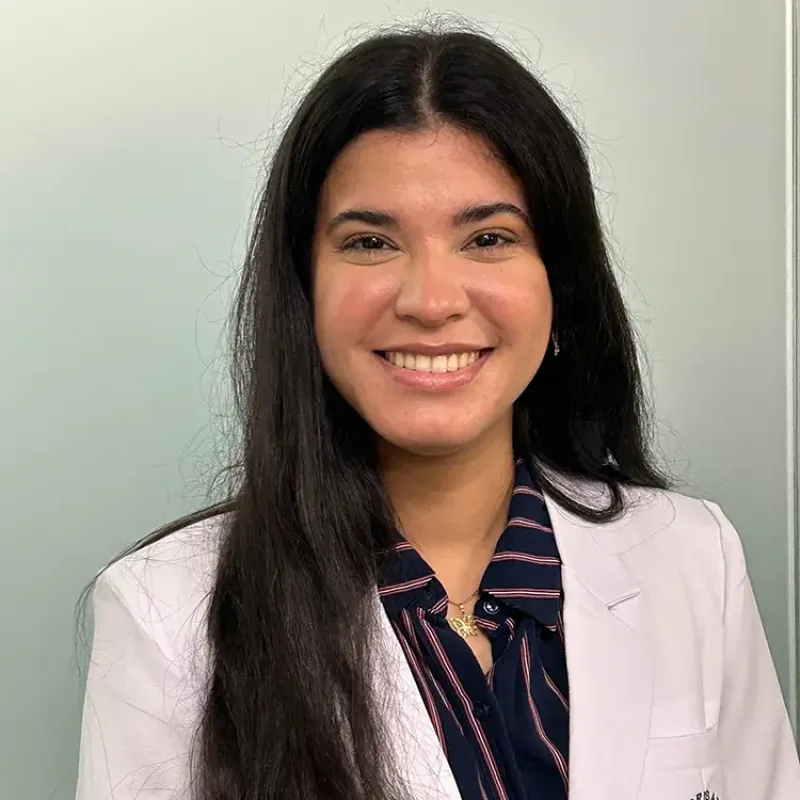
Fellowship Providing Adriana Ponton-Almodovar an Opportunity to Study New Chemo Delivery Options for Ovarian Cancer
By Chuck Carlson
From the time she was a child in her native Puerto Rico competing in a school science fair against students years older than her, Adriana Ponton-Almodovar has loved research.
She doesn’t remember what that school science project was (“My Mom probably has some pictures of it,” she with a smile), but she knows it sparked a love of science that has carried her today to a position as a doctoral candidate in the Pharmacology and Toxicology Department at Michigan State University.
Now in her fourth in the lab of mentors Dr. Jamie Bernard and Dr. Sachi Horibata, Ponton-Almodovar has focused her research on ovarian cancer and new ways to deliver chemotherapy to women who suffer from it.
Her work was recently bolstered by a one-year fellowship from the Lansing-based Aitch Foundation through the Joe D. Pentecost Foundation to provide the tools and research she needs. She is one of four MSU students to receive the research-based fellowship from a pool of 18 applicants.
Long interested in women’s health studies, she is studying how diet affects chemotherapy in ovarian cancer patients.
She said estimates are that 1 percent of women in 2024 will be diagnosed with ovarian cancer, “but it’s also the deadliest. One of the contributors for that is women start chemotherapy treatment, and they respond well. But within the first year, they will relapse because 80 percent of those tumors are resistant to the treatment. And I asked, ‘Why is this happening?’”
She added that one of the challenges is ovarian cancer is usually detected at a very late stage.
“When it’s found, it’s already in another organ, and the tumors are usually super small and cannot be removed surgically,” she said. Her research suggests that the layer of fat cells that surrounds and protects the abdominal organs provides energy for cancer cells to grow and mutate.
“The adipose (fat) cells provide different factors for cancer cells to grow more quickly and proliferate,” she said. “There are limited studies that show how the cancer cells stop responding to chemotherapy.”
In her recent studies, she exposed cancer cells to chemotherapy by forming a colony of those cells and introducing chemotherapy drugs. After two weeks of exposure, the cancer cells no longer responded to the chemotherapy.
“The colony of cancer cells will grow quicker and bigger with the introduction of fat,” she said.
In the studies supported by the Aitch Fellowship, she hopes to target a liver enzyme, glutamic-pyruvic transaminase 2 (GPT2). Stopping this enzyme from functioning has been shown to inhibit cancer cells and prevent their growth. This could offer a new way for chemotherapy to attack cancer cells.
“It could be a potential driver of the chemotherapy resistance,” she said. “Our studies are focused on elevating the role of GPT2 and looking at different compounds that target those resistant cells. One of our goals is to provide new chemotherapy options to these patients. We want to provide patients with alternatives.”
For Ponton-Almodovar, studying at MSU has provided her the freedom to research the project that has become so important to her.
After graduating college in Puerto Rico, she did a year of post-baccalaureate work at the University of Massachusetts Chan Medical School, where her interest in research flourished.
“In that post-baccalaureate program, you were doing research, but they also provided students with the different tools for how to prepare a CV, how to network, how to talk about your science with other people. You got professional development, and I went to a bunch of expos, and that’s how I got into MSU.”
In fact, her first doctoral application was sent to MSU.
“And I remember that my interview at MSU was completely online (due to the COVID-19 pandemic),” she said. “But I was very impressed because even on a screen, people made you feel so welcome in this environment. That really caught my attention. The students were happy doing research and getting their Ph.D.”
She is also happy to have been able to work in the labs of both Dr. Horibata and Bernard.
“They work with women’s diseases, and they gave me the opportunity,” Adriana said. “I was very happy that I’m working on what I’m interested in. And I’m very glad I crossed paths with them.”